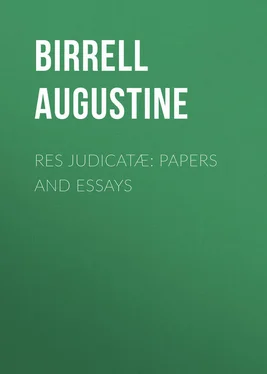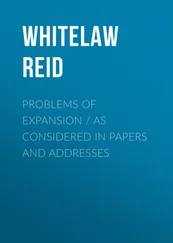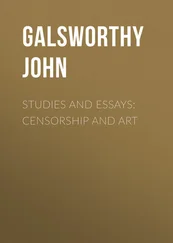Augustine Birrell - Res Judicatæ - Papers and Essays
Здесь есть возможность читать онлайн «Augustine Birrell - Res Judicatæ - Papers and Essays» — ознакомительный отрывок электронной книги совершенно бесплатно, а после прочтения отрывка купить полную версию. В некоторых случаях можно слушать аудио, скачать через торрент в формате fb2 и присутствует краткое содержание. Жанр: foreign_antique, foreign_prose, Историческая проза, на английском языке. Описание произведения, (предисловие) а так же отзывы посетителей доступны на портале библиотеки ЛибКат.
- Название:Res Judicatæ: Papers and Essays
- Автор:
- Жанр:
- Год:неизвестен
- ISBN:нет данных
- Рейтинг книги:3 / 5. Голосов: 1
-
Избранное:Добавить в избранное
- Отзывы:
-
Ваша оценка:
- 60
- 1
- 2
- 3
- 4
- 5
Res Judicatæ: Papers and Essays: краткое содержание, описание и аннотация
Предлагаем к чтению аннотацию, описание, краткое содержание или предисловие (зависит от того, что написал сам автор книги «Res Judicatæ: Papers and Essays»). Если вы не нашли необходимую информацию о книге — напишите в комментариях, мы постараемся отыскать её.
Res Judicatæ: Papers and Essays — читать онлайн ознакомительный отрывок
Ниже представлен текст книги, разбитый по страницам. Система сохранения места последней прочитанной страницы, позволяет с удобством читать онлайн бесплатно книгу «Res Judicatæ: Papers and Essays», без необходимости каждый раз заново искать на чём Вы остановились. Поставьте закладку, и сможете в любой момент перейти на страницу, на которой закончили чтение.
Интервал:
Закладка:
As for those of you who cannot read Richardson's nineteen volumes, it can only be said you are a large and intelligent class of persons. You number amongst you poets like Byron – for I presume Byron is still among the poets – and philosophers like d'Alembert, who, when asked whether Richardson was not right in imitating Nature, replied, 'Yes, but not to the point of ennui.' We must not bear you malice or blacken your private characters. On the other hand, you must not sneer at us or call us milksops. There is nothing to be proud of, I can assure you, in not being able to read Clarissa Harlowe , or to appreciate the genius which created Lovelace.
A French critic, M. Scherer, has had the audacity to doubt whether Tristram Shandy is much read in England, and it is commonly asserted in France that Clarissa is too good for us. Tristram may be left to his sworn admirers who could at any moment take the field with all the pomp and circumstance of war, but with Clarissa it is different. Her bodyguard is small and often in need of recruits. This indeed is my apology for the trouble I have put you to.
EDWARD GIBBON
'It was at Rome, on the 15th of October, 1764, as I sat musing amidst the ruins of the Capitol, while the bare-footed fryars were singing vespers in the Temple of Jupiter that the idea of writing the Decline and Fall of the City first started to my mind.
'It was on the day, or rather night, of the 27th of June, 1787, between the hours of eleven and twelve, that I wrote the last lines of the last page, in a summer-house in my garden. After laying down my pen I took several turns in a berceau , or covered walk of acacias, which commands a prospect of the country, the lake and the mountains. The air was temperate, the sky was serene, the silver orb of the moon was reflected from the waters and all nature was silent. I will not dissemble the first emotions of joy on recovery of my freedom and perhaps of the establishment of my fame. But my pride was soon humbled and a sober melancholy was spread over my mind by the idea that I had taken an everlasting leave of an old and agreeable companion, and that whatever might be the future date of my history, the life of the historian must be short and precarious.'
Between these two passages lies the romance of Gibbon's life – a romance which must be looked for, not, indeed, in the volumes, whether the original quartos or the subsequent octavos, of his history – but in the elements which went to make that history what it is: the noble conception, the shaping intellect, the mastered learning, the stately diction and the daily toil.
Mr. Bagehot has declared that the way to reverence Gibbon is not to read him at all, but to look at him, from outside, in the bookcase, and think how much there is within; what a course of events, what a muster-roll of names, what a steady solemn sound. All Mr. Bagehot's jokes have a kernel inside them. The supreme merit of Gibbon's history is not to be found in deep thoughts, or in wide views, or in profound knowledge of human nature, or prophetic vision. Seldom was there an historian less well-equipped with these fine things than he. Its glory is its architecture, its structure, its organism. There it is, it is worth looking at, for it is invulnerable, indispensable, immortal. The metaphors which have been showered upon it, prove how fond people have been of looking at it from outside. It has been called a Bridge, less obviously an Aqueduct, more prosaically a Road. We applaud the design and marvel at the execution.
There is something mournful in this chorus of approbation in which it is not difficult to detect the notes of surprise. It tells a tale of infirmity both of life and purpose. A complete thing staggers us. We are accustomed to failure.
‘What act proves all its thought had been?’
The will is weak, opportunities are barren, temper uncertain and life short.
‘I thought all labour, yet no less,
Bear up beneath their unsuccess;
Look at the end of work: contrast
The petty done – the undone vast.’
It is Gibbon's triumph that he made his thoughts acts. He is not exactly what you call a pious writer, but he is provocative of at least one pious feeling. A sabbatical calm results from the contemplation of his labours. Succeeding scholars have read his history and pronounced it good. It is likewise finished. Hence this feeling of surprise.
Gibbon's life has the simplicity of an epic. His work was to write his history. Nothing else was allowed to rob this idea of its majesty. It brooked no rival near its throne. It dominated his life, for though a man of pleasure, and, to speak plainly, a good bit of a coxcomb, he had always the cadences of the Decline and Fall in his ears. It has been wittily said of him, that he came at last to believe that he was the Roman Empire, or, at all events, something equally majestic and imposing. His life had, indeed, its episodes, but so has an epic. Gibbon's episodes are interesting, abrupt, and always concluded. In his sixteenth year he, without the aid of a priest or the seductions of ritual, read himself into the Church of Rome, and was one fine June morning in 1753 baptized by a Jesuit father. By Christmas, 1754, he had read himself out again. Gibbon's conversion was perfectly genuine and should never be spoken of otherwise than respectfully, but it was entirely a matter of books and reading. 'Persons influence us,' cries Dr. Newman, 'voices melt us, looks subdue us, deeds inflame us. Many a man will live and die upon a dogma; no man will be a martyr for a conclusion.' It takes all sorts to make a world, and our plump historian was one of those whose actions are determined in libraries, whose lives are unswayed by personal influences, to whom conclusions may mean a great deal, but dogmas certainly nothing. Whether Gibbon on leaving off his Catholicism ever became a Protestant again, except in the sense that Bayle declared himself one, is doubtful. But all this makes an interesting episode. The second episode is his well-known love affair with Mademoiselle Curchod, afterwards Madame Neckar and the mother of that social portent, Madame de Stael. Gibbon, of course, behaved badly in this affair. He fell in love, made known his plight, obtained mademoiselle's consent, and then speeded home to tell his father. 'Love,' said he, 'will make me eloquent.' The elder Gibbon would not hear of it: the younger tamely acquiesced. His very acquiescence, like all else about him, has become classical. 'I sighed as a lover, I obeyed as a son.' He proceeds: 'My wound was insensibly healed by time, absence and the habits of a new life.' It is shocking. Never, surely, was love so flouted before. Gibbon is charitably supposed by some persons to have regretted Paganism, but it was lucky for both him and for me that the gods had abandoned Olympus, since otherwise it would have required the pen of a Greek dramatist to depict the horrors that must have eventually overtaken him for so impious an outrage; as it was, he simply grew fatter every day. A very recent French biographer of Madame Neckar, who has published some letters of Gibbon's for the first time, evidently expects his readers to get very angry with this perfidious son of Albion. It is much too late to get angry. Of all the many wrongs women suffer at the hands of men, that of not marrying them, is the one they ought to find it easiest to forgive; they generally do forgive. Madame Neckar forgave, and if she, why not you and I? Years after she welcomed Gibbon to her house, and there he used to sit, fat and famous, tapping his snuff-box and arranging his ruffles, and watching with a smile of complacency the infantine, yet I doubt not, the pronounced gambols of the vivacious Corinne. After Neckar's fall, Gibbon writes to Madame: 'Your husband's condition is always worthy of envy, he knows himself, his enemies respect him, Europe admires him, you love him.' I decline to be angry with such a man.
Читать дальшеИнтервал:
Закладка:
Похожие книги на «Res Judicatæ: Papers and Essays»
Представляем Вашему вниманию похожие книги на «Res Judicatæ: Papers and Essays» списком для выбора. Мы отобрали схожую по названию и смыслу литературу в надежде предоставить читателям больше вариантов отыскать новые, интересные, ещё непрочитанные произведения.
Обсуждение, отзывы о книге «Res Judicatæ: Papers and Essays» и просто собственные мнения читателей. Оставьте ваши комментарии, напишите, что Вы думаете о произведении, его смысле или главных героях. Укажите что конкретно понравилось, а что нет, и почему Вы так считаете.












